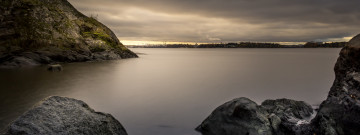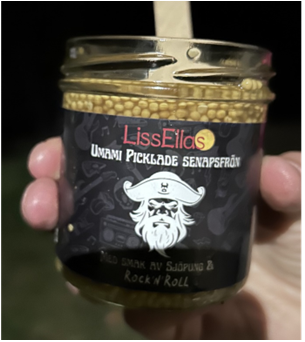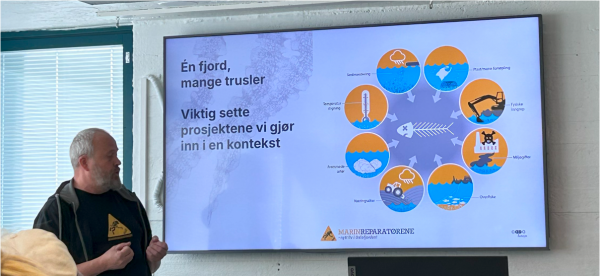Exploring Regenerative Ocean Farming as a growing advantage for the Baltic Sea – a Finnish perspective

A Nordic network meeting for project Havhøst at Tvärminne Zoological station
I had the pleasure to attend the Nordic network meeting for Regenerative Ocean Farming at Tvärminne zoological station in Hanko, Finland on October 3-4, 2024. The setting was perfect, as the zoological station is an innovative and research-oriented environment by the coast of the Baltic Sea, with marine research as the major topic for the research station.
The event brought together experts and enthusiasts from various fields to discuss and collaborate on regenerative ocean farming and sustainable practices. As the research manager and senior lecturer in Business Administration at Novia, I signed up for the event out of pure interest in regenerative ocean farming, and to see, how the expertise and knowledge of the faculty of business could help drive the sustainable communities and drive sustainable business.
Regenerative Ocean Farming: Insights and Innovations
In the dark Finnish autumn evening, the event kicked off with sauna and some unusual, ocean farmed snacks, such as mustard seeds with an umami taste from sea squirt, roe from European smelt and butter fried freshwater mussels, grown off the Ostrobothnian coastline of Finland. The innovative tastes of the food set the stage for initial discussions on what can actually be grown in water with such low salinity as in the Baltic Sea.

Figure 1: Umami pickled mustard seeds with sea squirt – an unusual taste in a well branded jar
The meeting started with presentations of existing projects with examples of communities driving regenerative ocean farming:
The CoolBlueFuture web page is a platform for projects with the aim to support community-led regenerative “ocean farming” in marine, brackish or freshwater ecosystems across the Baltic and North Seas. The projects aim to foster an enabling environment for community enterprises, predominantly through education, awareness-raising and community activism.
Havhøst is a Danish initiative focused on regenerative ocean farming, cultivating seaweed, mussels, and oysters to positively impact marine ecosystems. Joachim Hjerl presented the Danish case of community-based regenerative ocean farming, highlighting the movement's success and the potential for similar initiatives in other regions. The concept of blue community gardens relies on volunteer work and fosters a sense of community and environmental stewardship.
Marinreparatørerne The Marine Repairers is a non-profit organization dedicated to improving the marine ecosystems in the Inner Oslofjord through various knowledge-based projects such as clean-up, dissemination, protection, and marine restoration, in collaboration with academic communities.

Figure 2: Lars Dalen presents the challenges of Oslofjorden
Gothenburg University cooperates with the City of Gothenburg around a teaching and community platform built in the city center of Gothenburg. Marine Biologist Maria Bodin from Gothenburg University shared her expertise on ocean-related questions and the urban environment of Gothenburg. She presented Flytevi, The Gothenburg Marine Allotment, located in one of the harbour basins in Frihamnen. It was developed as a prototype to test new solutions in urban development projects and at the same time increase interest and knowledge about cultivation in the sea.
In addition, the Badass Seaweed business and the BioBUZ-project were presented. These presentations especially emphasized how a few people with their mind set on making change, can really make a difference, both when it comes to strengthening a specific community, and (for) driving new business opportunities that might, in the end, create a larger impact on the environment.
Reflections and Takeaways
For me, working with business and people, the highlights were the presentations of homemade rafts for ocean farming, on the surface or underwater. Despite the initial challenges, the projects have showcased resilience, and adaptability of plants and oysters, both wonderful storytellers of the underwater world. The educational programs for blue gardening were also significant from a societal point of view, aimed at spreading the joy of marine cultivation to a broader audience. The Nordic network meeting at Tvärminne was a remarkable experience that underscored the importance of collaboration and innovation in addressing environmental challenges. The diverse range of topics covered, from regenerative business models to educational initiatives, provided a comprehensive understanding of the current landscape and future possibilities.
As I reflect on the event, I am inspired by the passion and dedication of the participants. The knowledge shared and connections made will undoubtedly contribute to the advancement of sustainable practices in our communities. In addition, it was also debated how Finland could take a more active role in driving regenerative ocean farming in low salinity water. As Finland is mostly surrounded by it, and with the unwanted, but probable rising sea levels in the world, due to climate change, it is likely that knowledge in ocean farming will be needed to feed a growing global population.
I look forward to seeing the positive impact of these initiatives and continuing the discussion on regenerative ocean farming. I can truly see that Novia University of Applied Sciences, being a coastal university and change agent on the Finnish coast, could have a crucial role in this development, connecting the dots between research, community, authorities and businesses, to drive the ocean welfare of the Baltic Sea.
Hanna Guseff, Research Manager, Sustainable Communities and Businesses
Reseskildringen har godkänts för publicering av Novias redaktionsråd 7.11.2024.
ISSN: 2670-028X
![]()
Reseskildringen har publicerats i Novias publikationsserie RS: Reseskildringar. Inläggen har godkänts av Novias redaktionsråd.
Novia Publikation och produktion, serie RS: Reseskildring, ISSN: 2670-028X
Vi följer CC_BY 4.0 om inget annat nämns.